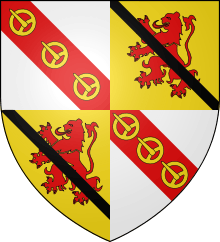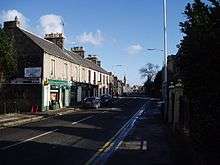George Leslie, 1st Earl of Rothes
George Leslie, 1st Earl of Rothes (c. 1406/1417–1490) [1] was a Scottish nobleman and the first to hold the title of
| George Leslie | |
|---|---|
| The Right Honourable Earl of Rothes | |
 | |
| Earl of Rothes | |
| Term | 1457-1490 |
| Predecessor | New Creation |
| Successor | George Leslie |
|
Titles and styles
The Right Honourable Lord Leslie | |
| Born | c. 1406-1417 |
Issue
| |
| Father | Lord James Leslie |
"Earl of Rothes", a hereditary title of the ruler of Leslie, Fife and the lands belonging to the Earl of Rothes.

Created Lord Leslie in 1445, the title of Earl of Rothes was created in 1458[2] in the Peerage of Scotland for him by James II of Scotland. He was born sometime between 1406-1417 and died in 1490, his rule as earl was c. 1458-1490, he was succeeded by his son, also called George Leslie or, as some call him, George Leslie II.
Family
He was the son of Norman Leslie of Fythkill in Fife. George was the brother of Elizabeth Leslie and father of George Leslie, First Laird of Aikenway; Christian Sinclair, Countess of Orkney; Andrew Leslie, Master of Rothes; Lady Elizabeth Leslie and John Leslie, First Laird of Pitnamoon. He was also the husband of Margaret Lundie, Christina Halyburton and Elizabeth Campbell.
Lord Leslie and Earl of Rothes
He was given the title Lord Leslie in 1445 and in 1458 was given the title of Earl of Rothes by James II of Scotland. He died in 1490 and was between 76 and 92 years old at the time; most likely 84.
Successor
He was succeeded by his son George Leslie II who ruled as Earl from 1492-1509, it is unknown why there was a brief interregnum of Earls from 1490-1492 also some say James IV prevented him from being Earl until 1492.
References
- ↑ "George Leslie, 1st Earl of Rothes". geni_family_tree. Retrieved 2017-05-26.
- ↑ "Rothes, Earl of (S, 1457/8)". www.cracroftspeerage.co.uk. Retrieved 2017-05-26.
| Peerage of Scotland | ||
|---|---|---|
| New creation | Earl of Rothes 1458–1490 |
Succeeded by George Leslie |